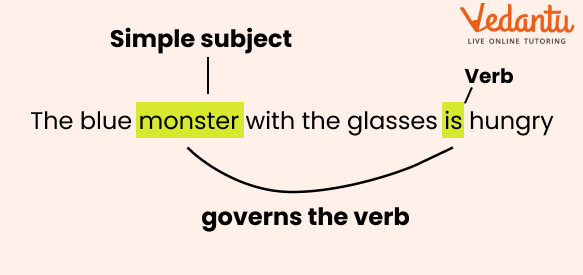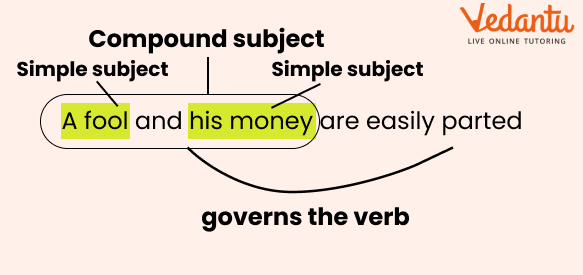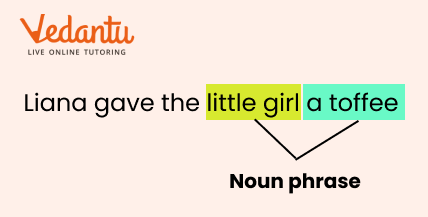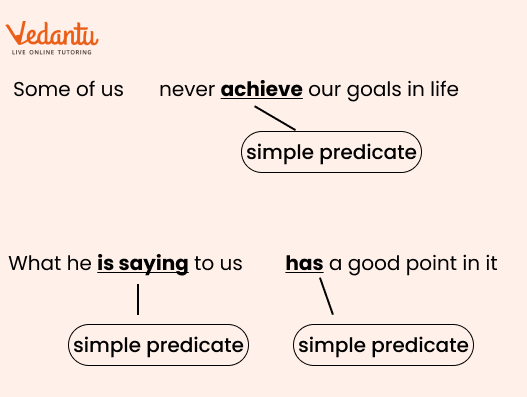




Practice Questions on Subject and Predicate for Exam Success
In grammar, every sentence has two main parts: the subject and the predicate. The subject tells us who or what the sentence is about, like "The cat" in "The cat sleeps." The predicate explains what the subject is doing or what is happening to it, such as "sleeps" in the same sentence. Understanding these parts helps us create clear and correct sentences, making it easier to communicate our ideas.
What is Subject?
A subject is one of the two primary components of a sentence in English grammar. The naming part of a sentence or clause is sometimes referred to as the subject. The subject normally comes early in the sentence to indicate the subject of the phrase, or who or what acts.
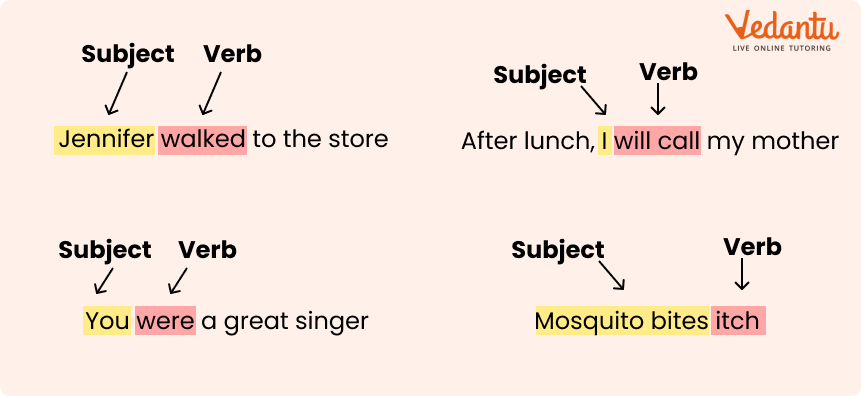
What is Predicate?
The predicate is placed after the subject and is the other major component in a sentence. The part of a sentence that alters the subject of a phrase or clause in any way is called the predicate. The predicate describes what the subject is or does, as well as what happens to it. Since the subject of a sentence is a person, place, or thing.
The predicate must include a verb that explains what the subject does. A modifier, an object, or a complement might also be included.
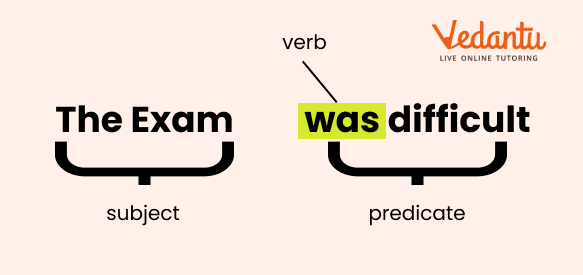
Types of Subject
Types of Predicate
Subject and Predicate Examples
The following table contains 20 sentences with subject and predicate that will help the students understand and identify the subject and predicate differences better. Read and understand the predicate and subject examples.
Subject and Predicate Worksheet
A. Identify the subject and predicate.
1. The apple is red.
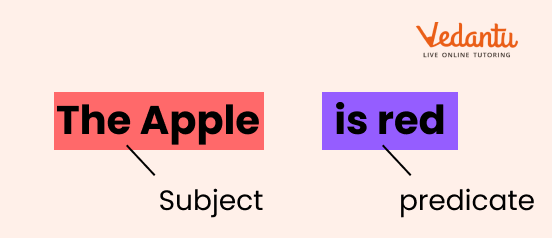
Ans. Subject- The apple
Predicate- is red.
2. The rain sounded like a lullaby.
Ans: Subject- The rain
Predicate- sounded like a lullaby.
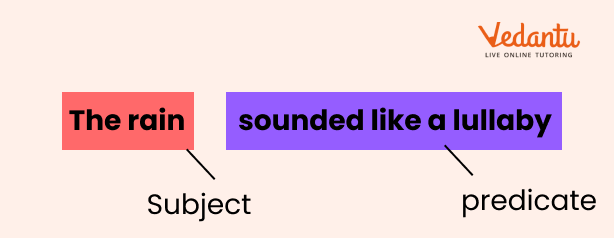
3. Mr Batra lost his hat.
Ans: Subject- Mr Batra
Predicate- lost his hat.
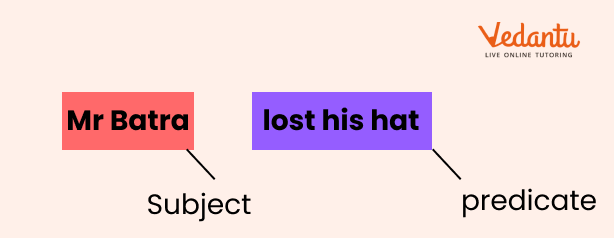
4. The ball rolled down the hill.
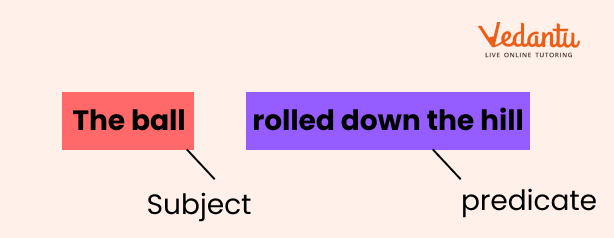
Ans: Subject- The ball
Predicate- rolled down the hill.
Learn By Doing It Yourself: Subject and Predicate Exercise
A. Circle the subject and underline the predicate.
1. Dogs are furry.
Subject: Dogs
Predicate: are furry
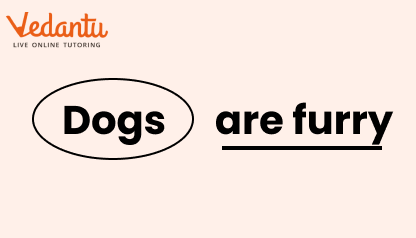
2. My mother baked a cake for the party.
Subject: My mother
Predicate: baked a cake for the party
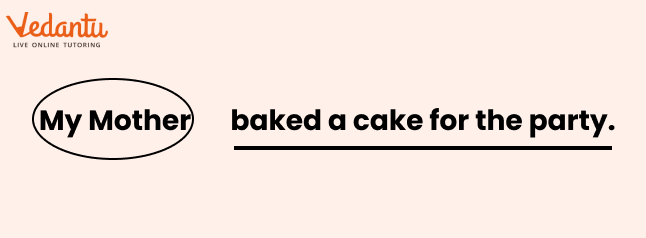
3. Cats purr.
Subject: Cats
Predicate: purr
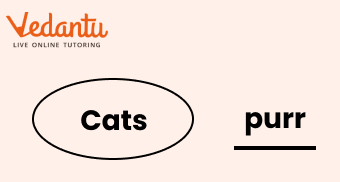
4. I will not go to the swimming practice today.
Subject: I
Predicate: will not go to the swimming practice today

5. Sita and Geeta are twins.
Subject: Sita and Geeta
Predicate: are twins
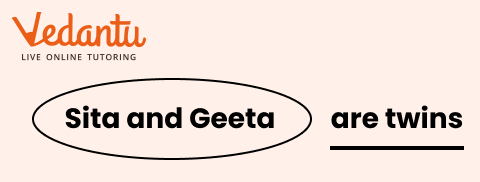
6. Sonu and his neighbour got into an argument.
Subject: Sonu and his neighbour
Predicate: got into an argument

Test your Knowledge of Subject and Predicate
Below we have some subject and predicate questions for your practice.
1. Identify the Subject and Predicate:
The dog barked loudly.
The teacher and her students worked on the project.
During the summer, the sun shines brightly.
2. Complete the Sentence:
The children __________ in the park.
(play / played / playing)
My brother and I __________ a new game yesterday.
(discuss/discusses/discussed)
The cat __________ on the windowsill.
(sleeps / sleep/sleeping)
3. Rewrite the Sentences with Compound Subjects and Predicates:
Rewrite: "Sarah reads books. She also writes stories."
Example: "Sarah reads books and writes stories."
Rewrite: "The dog ran fast. It barked loudly."
Example: "The dog ran fast and barked loudly."
4. Identify the Subject and Predicate in the Following Questions:
What time does the train arrive?
Where did the children go for their summer vacation?
Who is responsible for the project?
5. Circle the Subject and Underline the Predicate:
The chef in the restaurant prepares delicious meals.
The birds in the sky flew high above the trees.
My friend and I visited the new museum last weekend.
6. Choose the Correct Predicate for Each Subject:
The students (are/is) excited about the trip.
The car (needs/need) to be repaired.
My family (enjoys/enjoy) going to the beach.
7. Fix the Errors in the Subject-Verb Agreement:
The books on the shelf are dusty.
The team were playing well last night.
Neither the cat nor the dog were at home.
8. Combine the Sentences with Appropriate Conjunctions:
The cat slept. The dog played.
Example: "The cat slept while the dog played."
She writes poems. She also paints.
Example: "She writes poems and paints."
9. Identify and Correct Sentence Fragments:
Although the sun was shining.
My brother went to the store for groceries.
Because the movie was interesting and the snacks were delicious.
10. Create yYour Sentences:
Write a sentence with a compound subject and a compound predicate.
Write a question with the subject coming after the predicate.
Write a sentence where the subject is implied.
Find out if you got them all right from the answers below.
1. Identify the Subject and Predicate:
The dog barked loudly.
Subject: The dog
Predicate: barked loudly
The teacher and her students worked on the project.
Subject: The teacher and her students
Predicate: worked on the project
During the summer, the sun shines brightly.
Subject: the sun
Predicate: shines brightly
2. Complete the Sentence:
The children play in the park.
My brother and I discussed a new game yesterday.
The cat sleeps on the windowsill.
3. Rewrite the Sentences with Compound Subjects and Predicates:
Sarah reads books and writes stories.
The dog ran fast and barked loudly.
4. Identify the Subject and Predicate in the Following Questions:
What time does the train arrive?
Subject: the train
Predicate: does arrive
Where did the children go for their summer vacation?
Subject: the children
Predicate: did go for their summer vacation
Who is responsible for the project?
Subject: who
Predicate: is responsible for the project
5. Circle the Subject and Underline the Predicate:
The chef in the restaurant prepares delicious meals.
The birds in the sky flew high above the trees.
My friend and I visited the new museum last weekend.
6. Choose the Correct Predicate for Each Subject:
The students are excited about the trip.
The car needs to be repaired.
My family enjoys going to the beach.
7. Fix the Errors in the Subject-Verb Agreement:
The books on the shelf are dusty.
The team was playing well last night.
Neither the cat nor the dog was at home.
8. Combine the Sentences with Appropriate Conjunctions:
The cat slept while the dog played.
She writes poems and paints.
9. Identify and Correct Sentence Fragments:
Although the sun was shining. (Complete: Although the sun was shining, we stayed indoors.)
My brother went to the store for groceries. (Correct as is.)
Because the movie was interesting and the snacks were delicious. (Complete: Because the movie was interesting and the snacks were delicious, we stayed for the second show.)
10. Create your Sentences:
A sentence with a compound subject and a compound predicate: The cat and the dog slept and played in the yard.
A question with the subject coming after the predicate: Does the teacher know the answer?
A sentence where the subject is implied: Close the door. (Implied subject: you)
Takeaways from this Page
Every complete sentence needs both a subject and a predicate. The subject tells us who or what the sentence is about, while the predicate provides information about the subject’s actions or state.
Ensuring that the subject and predicate agree in number (singular or plural) is essential for grammatical correctness. This agreement helps maintain clarity and coherence in writing.
Recognising and correcting common errors, such as subject-verb disagreement and sentence fragments, improves the accuracy and readability of sentences.
A strong grasp of subjects and predicates enhances overall writing skills, helping to convey ideas more clearly and effectively.
FAQs on Subject and Predicate-Definition, Examples, Exercises
1. What is the definition of a subject in a sentence?
The subject of a sentence is the person, place, or thing that is acting or is the main focus of the sentence. It tells us who or what the sentence is about and typically includes a noun or pronoun, along with any modifiers.
2. How do I identify the subject of a sentence?
To identify the subject, look for who or what is performing the action or being described in the sentence. It is often found before the verb and can be a single noun, pronoun, or a combination of words.
3. What is a predicate in a sentence?
The predicate is the part of the sentence that tells us what the subject does or what happens to the subject. It includes the verb and any additional words that provide more detail about the action or state of the subject.
4. How to spot a predicate in a sentence?
To find the predicate, look for the verb and any words that follow it, which describe what the subject is doing. The predicate can be a simple verb, a compound verb, or a complete set of words that include the verb and its modifiers.
5. Can ‘ran’ be considered a predicate in a sentence?
Yes, ‘ran’ can be considered a basic predicate as it is the main action performed by the subject. For a complete predicate, additional words that describe the action further, such as "ran quickly towards the school to meet his friends," are included.
6. What is the difference between a simple and compound predicate?
A simple predicate consists of a single verb or verb phrase, while a compound predicate involves two or more verbs connected by conjunctions, describing multiple actions performed by the subject.
7. Can a subject be more than one word?
Yes, a subject can consist of more than one word. For example, "The tall man with the hat" is a complex subject, with "The tall man" being the core subject and "with the hat" providing additional detail.
8. What is a complete predicate?
A complete predicate includes the verb and all the words that modify or describe the verb, providing a full picture of the action or state of the subject. For instance, "sang loudly in the concert hall" is a complete predicate.
9. How can I improve my understanding of subjects and predicates?
Practice identifying subjects and predicates in various sentences, use grammar exercises and worksheets, and review examples to strengthen your understanding. Reading and writing regularly can also help reinforce these concepts.
10. What are some common errors in subject-predicate agreement?
Common errors include mismatching singular and plural forms between the subject and predicate, incorrect verb tense usage, and confusing sentence fragments. Carefully checking the agreement and structure can help avoid these mistakes.

















